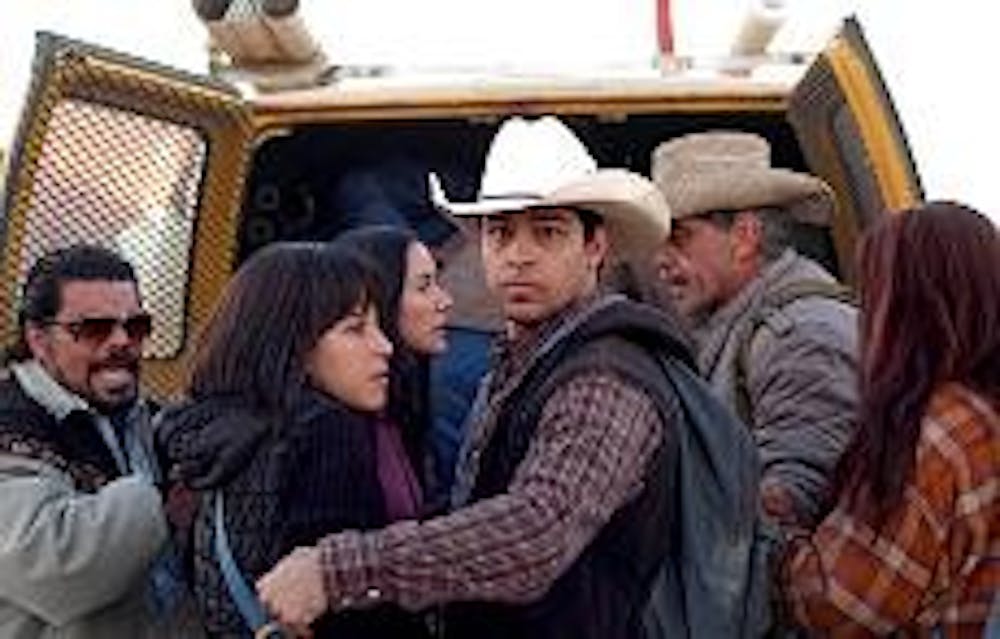"Fast Food Nation" does America a service by taking the abuses and disgusting crimes against nature that make up today's fast food industry and making them public. Richard Linklater's dramatic adaptation of Eric Schlosser's 2001 muckraker, about how the burger gets from farm to foil, puts everything that doesn't particularly want to be shown on celluloid. Despite the film's ambition to be this generation's "The Jungle," this burger needs more flavor.
"It's all about uncovering the truth, what's behind the curtain," director Linklater said in a telephone interview.
Like the book, the movie is idealistic and ambitious. But unlike the nonfiction text, the film puts the examples in a fictional setting.
"It's really different than the book, fundamentally different," Schlosser said.
But "it shares the subject matter, and I also think it shares a refusal to sugar the pill, and a refusal to tell people what they want to hear," he said.
The dramatization gives the chance to put a human face on the actual events, which pushed the decision to make it a fictional piece and not a documentary.
"Film's kind of magical," Linklater said. "It gives you the chance to actually walk in someone else's shoes. I think the lives depicted in this movie are systematically ignored in the media landscape."
Unlike a cold documentary, this movie intentionally pushes a relationship to the characters to reinforce the impact of the movie. The movie symbolically opens with a shiny, happy "Mickey Burger" chain, complete with suburban upper-middle-class customers. The image zooms in on a typical grayish brown burger patty-right before it's revealed that there's too much bovine manure in it. New ad executive Don Anderson (Greg Kinnear), father of the new "Big One," is sent out to a meatpacking plant in Colorado to examine the situation. The movie quickly wanders from that storyline, providing a variety meal of different perspectives on the industry. Start with the illegal immigrants who, after driving across the border, take on the abominable conditions in the plant, as well as the threatening and sexually harassing supervisor. Audiences meet Amber (Ashley Johnson), the local high school girl working at a Mickey Burger, as well as a host of other characters. "Fast Food Nation" shows the plight of everyone affected by the fast food industry, from the meat buyer to the farmer to the activist to the chemist making tasty artificial lime flavoring.
"Fast Food Nation," in its dramatization, at the very least could change eating habits for a while. The film succeeds in what it set out to do, but goes above and beyond. The general flow of the movie shows how disgusting the industry really is. The particularly gory slaughter of cows in the meatpacking plant and the glob of spittle that finishes off the burger will undoubtedly empty some stomachs.
"The film strives just to be realistic," Linklater said.
In doing so it doesn't pull any punches. Everything in the movie was filmed on location.
"We got access to a facility while filming down in Mexico," Linklater said.
All animals were real and the equipment was the actual machinery used in the plants, making the imagery all the more haunting. What makes the scene even more haunting is the fact that the plant, despite its presentation as an average meatpacking facility in the movie, was "significantly smaller than the ones in the United States," according to Schlosser.
"Factories in the U.S. can put out 350 to 400 cattle an hour on one production line," he said.
Every scene has its political points to make, and characters don't get enough dialogue to really make anybody care about them. That might have been foresight, as characters disappear or storylines intersect without warning. Once they make their points, they're gone. But the beef isn't in the dialogue for this movie. Linklater's film shows how big corporations poison everything they touch. Nearly everybody loses in order to get that cheap burger to the consumer, and after seeing "Fast Food Nation" it won't leave quite as good a taste in the mouth. The most frightening thing is that everything in the movie is true.
"What the movie showed is happening somewhere in this country right now," Schlosser said.





